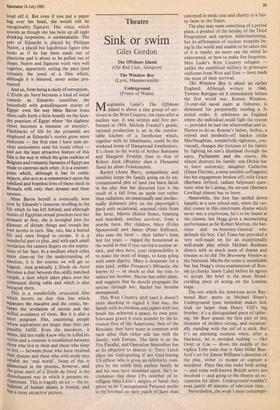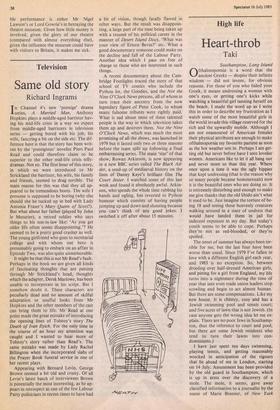Theatre
Sink or swim
Giles Gordon
The Offshore Island (Old Red Lion, Islington) The Winslow Boy (Lyric, Hammersmith) Underground (Prince of Wales)
Marghanita Laski's The Offshore Island is about a tiny group of sur- vivors in the West Country, ten years after a nuclear war. It was written and first per- formed in 1954. Michele Frankel's gentle, rational production is set in the comfor- table kitchen of a farmhouse which, together svith its inhabitants, could be the weekend home of Hampstead freethinkers. It's closer to the world of Arthur Ransome and Margaret Drabble than to that of Robert Junk (Brighter than a Thousand Suns) let alone Frankenstein.
Rachel (Anna Barry, sympathetic and sensible) keeps the family going on its un- contaminated plot of land (we learn latish in the play that her distorted foot is the result of a fall from an apple tree rather than radiation, an emotionally and intellec- tually dishonest ploy on the playwright's part) with occasional, seasonal visits from her lover, Martin (Robin Soans, beaming and bearded), another survivor, from a nearby farm. Her children, Mary (Erika Spotswood) and James (Peter Sullivan), who runs the farm — their father's been lost for years — regard the homestead as the world in that if you survive a nuclear at- tack, and they have, your responsibility is to make the most of things, to keep going with some dignity. Mary is desperate for a man (and, unlike Prospero's Miranda, she knows it) — so much so that she tries to seduce her brother. Martin has other ideas, and suggests that he should propagate the species through her; Rachel has become menopausal.
This West Country idyll (and it doesn't seem shocking to regard it that way, the family with its chickens and piglets with two heads has achieved a peace, its own post- holocaust grace) is riven asunder by the in- trusion first of the Americans, then of the Russians: they have more in common with each other than either side has with the family, with Europe. The farm is on the 51st Parallel, and Operation Neutraliser has as its objective to destroy it. Terry Leech plays the God-quoting if not God-fearing US officer who is given an inferiority com- plex by the stable little nuclear family he and his men have stumbled upon. He's in- credulous that these CPs (another of in- telligent Miss Laski's sleights of hand: they prove to be Contaminated Persons) prefer to be bombed on their patch of farm than
conveyed in mink coat and charity to a fun- ny farm in the States.
The play may seem something of a period piece, a product of the heyday of the Third Programme and earnest Aldermastoning, but its affirmation of nuclear weapons be- ing in the world and unable to be taken out of it is timely: no more can the wheel be uninvented, or how to make fire forgotten. Miss Laski's West Country refugees — unlike the zombiised military in grotesque uniforms from West and East — have made the most of their survival.
The Winslow Boy is about an earlier England. Although written in 1946, Terence Rattigan set it immediately before the first world war. Ronnie Winslow, 13-year-old naval cadet at Osborne, is dismissed for purportedly stealing a 5s postal order. It celebrates an England where the individual could fight the system — provided he had the wherewithal and in- fluence to do so. Ronnie's father, Arthur, a retired and modestly-off banker (Alan MacNaughtan, wonderfully righteous, con- vinced), changes the fortunes of his family by fighting his son's dismissal through the navy, Parliament and the courts. He almost destroys his family: son Dickie has to leave university; daughter Catherine (Diane Fletcher, a most sensible suffragette) has her engagement broken off; wife Grace (Barbara Jefford, radiant helpmeet) ques- tions what he's doing; the servant (Barbara Cowling) almost has to leave.
Meanwhile, the boy has settled down happily at a new school and, when the ver- dict comes in this courtroom drama which never sees a courtroom, he's to be found at the cinema. Ian Hogg gives a mesmerising performance as Sir Robert Morton, the bar- rister and ex-Attorney-General who defends the boy. Carl Toms has provided a very well-made set for an exceptionally well-made play which Michael Rudman directs with as much sense of drama and tension as he did The Browning Version at the National. Maybe the scene is unsinkable but Ian Hogg's cross-examination of Ron- nie (a cheeky Jason Lake) before he agrees to accept the brief is the most blood- curdling piece of acting on the London stage.
The suit which the American actor Ray- mond Burr sports in Michael Sloan's Underground (pun intended) makes him look no larger than Henry VIII's big brother: it's a distinguished piece of tailor- ing. Mr Burr spends the first part of this dreariest of thrillers sitting, and occasion- ally standing with the aid of a stick. But it's an alarming moment when, after a blackout, he is revealed rushing — like Ovett or Coe — down the middle of the replica Tube train that is Alan Miller Bun- ford's set for Simon Williams's direction of the play, either to escape or capture a murderer. Plays like this make both acting — and some well-known British actors are involved — and going to the theatre an oc- cupation for idiots. Underground wouldn't even justify 45 minutes of television time.
Nevertheless, the week's most contempti-
ble performance is either Mr Nigel Lawson's or Lord Gowrie's in betraying the theatre museum. Given how little money is involved, given the glory of our theatre (compared with almost everything else), given the influence the museum could have with visitors to Britain, it makes me sick.







































 Previous page
Previous page